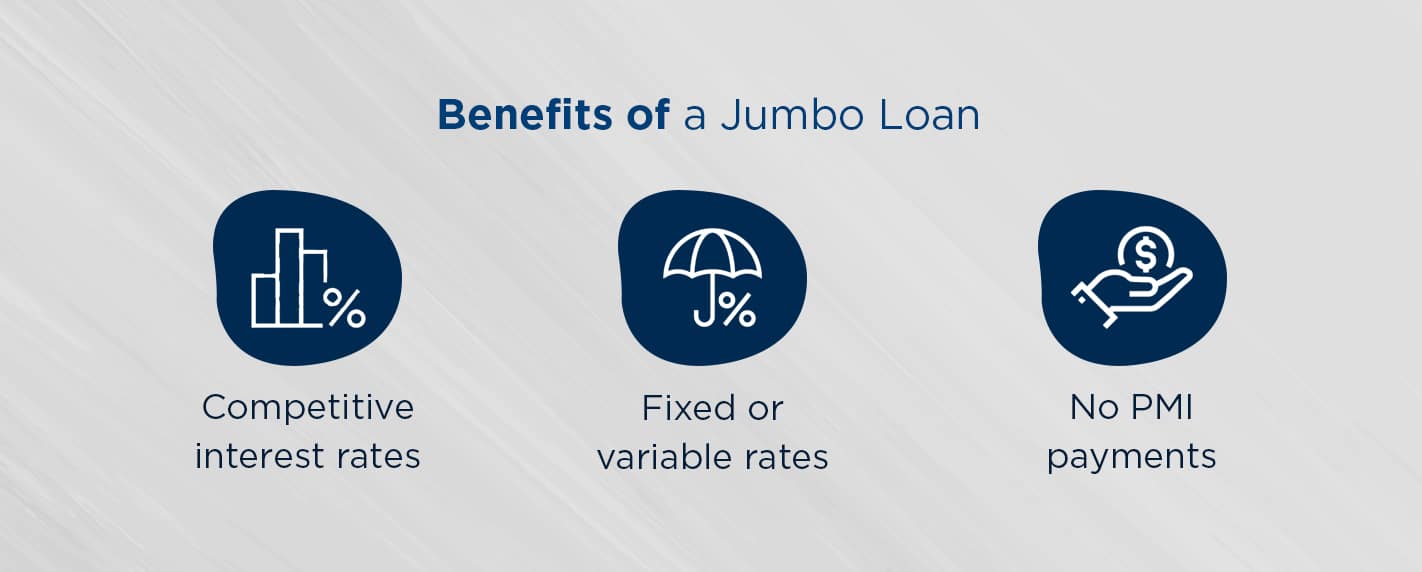Jumbo Loan: Financing Solutions for Houses Above Conforming Limits
Jumbo Loan: Financing Solutions for Houses Above Conforming Limits
Blog Article
Navigating the Jumbo Funding Landscape: Crucial Insights for First-Time Homebuyers
Navigating the complexities of jumbo lendings presents a distinct set of obstacles for new buyers, particularly in an evolving real estate market. Understanding the essential eligibility requirements and possible advantages, together with the downsides, is important for making notified decisions. Additionally, creating a strong monetary method can significantly enhance your prospects. Involving with professionals in the field can illuminate paths that might at first seem daunting. As you discover these ins and outs, it becomes clear that a much deeper understanding can reveal opportunities that could or else be neglected. Exactly how can you best position yourself for success in this specialized segment of lending?
Understanding Jumbo Financings

Because jumbo lendings are not backed by government-sponsored entities, they bring various underwriting criteria and call for even more extensive financial documentation. This difference can cause higher rate of interest rates compared to conventional car loans, provided the enhanced risk to lenders. Big finances likewise offer distinct advantages, such as the ability to fund higher-value buildings and potentially extra adaptable terms.
Novice homebuyers must likewise be mindful that securing a big loan typically necessitates a bigger down payment, typically varying from 10% to 20%. Additionally, consumers are typically anticipated to demonstrate strong credit reliability and a steady revenue to qualify. Recognizing these subtleties can empower newbie homebuyers to make educated choices when exploring jumbo financing choices in their search of homeownership.
Qualification Requirements
Protecting a jumbo funding requires conference specific eligibility demands that vary dramatically from those of conventional finances. Unlike conventional financings, which are usually backed by government-sponsored entities, big fundings are not guaranteed or assured, causing more stringent standards.
One primary requirement is a higher credit report. Lenders commonly anticipate a minimal rating of 700, although some might permit reduced ratings under specific problems (jumbo loan). Furthermore, consumers have to show a robust monetary profile, which includes a low debt-to-income (DTI) proportion, generally no greater than 43%. This makes certain that consumers can manage their monthly settlements along with various other monetary responsibilities.
Additionally, many lenders call for considerable documentation, consisting of proof of income, possession statements, and tax returns for the previous two years. A substantial deposit is also essential; while standard fundings may permit deposits as reduced as 3%, jumbo financings commonly necessitate at the very least 20%, depending upon the finance and the loan provider quantity.

Advantages of Jumbo Financings
For many novice property buyers, jumbo finances supply distinctive advantages that can facilitate the trip towards homeownership. Among the main advantages is the capacity to fund residential properties that go beyond the adjusting lending limits set by government-sponsored entities. This flexibility enables buyers to access a wider series of high-value residential or commercial properties in competitive realty markets.
Additionally, big lendings commonly come with eye-catching rate of interest that can be less than those of standard finances, particularly for debtors with solid credit rating accounts. This can result in substantial savings over the life of the lending, making homeownership a lot more affordable. Additionally, jumbo lendings normally permit greater lending quantities without the need for personal home loan insurance (PMI), which can additionally reduce monthly repayments and general expenses.

Potential Downsides
Several possible property buyers might discover that jumbo finances featured considerable downsides that necessitate mindful factor to consider. One of the primary concerns is the stringent credentials standards. Unlike adjusting financings, big finances normally need higher credit history, frequently surpassing 700, and considerable income documentation, making them much less easily accessible for some customers.
Additionally, big finances typically come with greater rate of interest contrasted to traditional fundings, which can result in increased month-to-month repayments and overall loaning expenses. This premium might be particularly burdensome for new property buyers who are currently navigating the economic complexities of acquiring a home.
One more notable disadvantage is the larger down settlement requirement. Several loan providers anticipate a minimum down payment of 20% or more, which can posture a difficulty for customers with limited cost savings. Furthermore, the absence of federal government backing for big fundings leads check to much less positive terms, increasing the danger for lenders and, as a result, the loaning expenses for house owners.
Finally, market changes can significantly influence the resale worth of high-end residential or commercial properties financed with jumbo financings, adding an element of financial unpredictability that new homebuyers may find overwhelming.
Tips for First-Time Homebuyers
Navigating the complexities of the homebuying process can be overwhelming for first-time buyers, especially when thinking about jumbo loans (jumbo loan). To simplify this journey, adhering to some key techniques can make a substantial distinction
First, enlighten on your own on big financings and their details needs. Understand the different loaning standards, including credit history, debt-to-income proportions, and down repayment expectations. Generally, a minimum credit rating score of 700 and a deposit of a minimum of 20% are essential for approval.
2nd, involve with a well-informed mortgage professional. They can provide understandings customized to your financial situation and aid you navigate the complexities of the big loan landscape.
Third, consider pre-approval to strengthen your investing in setting. A pre-approval letter signals to sellers that you are a significant purchaser, which can be beneficial in competitive markets.
Last but not least, do not overlook the importance of budgeting. Consider all expenses connected with homeownership, including residential property tax obligations, upkeep, and home owners' insurance. By following these tips, first-time buyers can come close to the big financing procedure with better self-confidence and clearness, boosting their opportunities of effective homeownership.
Final Thought
Finally, navigating the jumbo lending landscape requires a comprehensive understanding of qualification standards, benefits, and potential drawbacks. New buyers can enhance their opportunities of success by keeping a strong credit history, managing their debt-to-income ratio, and planning for bigger down payments. Involving with educated home loan professionals and getting pre-approval can even more strengthen placements in open markets. Ultimately, detailed prep work and education pertaining to jumbo lendings can bring about more enlightened decision-making in the homebuying procedure.
When browsing the complexities of the real estate market, recognizing jumbo financings is important for new homebuyers intending for homes that go beyond conventional funding restrictions. Jumbo fundings are non-conforming car loans that commonly go why not find out more beyond the adjusting car loan limitation established by the Federal Real Estate Finance Firm (FHFA)Furthermore, jumbo car loans typically come with eye-catching rate of interest rates that can be lower than those of traditional financings, especially for debtors with solid credit accounts. Big lendings generally permit for greater lending amounts without the demand for exclusive home loan insurance policy (PMI), which can better lower general expenses and regular monthly settlements.
Unlike adapting financings, jumbo financings typically call for greater credit ratings, often exceeding 700, and significant revenue blog here paperwork, making them less available for some borrowers.
Report this page